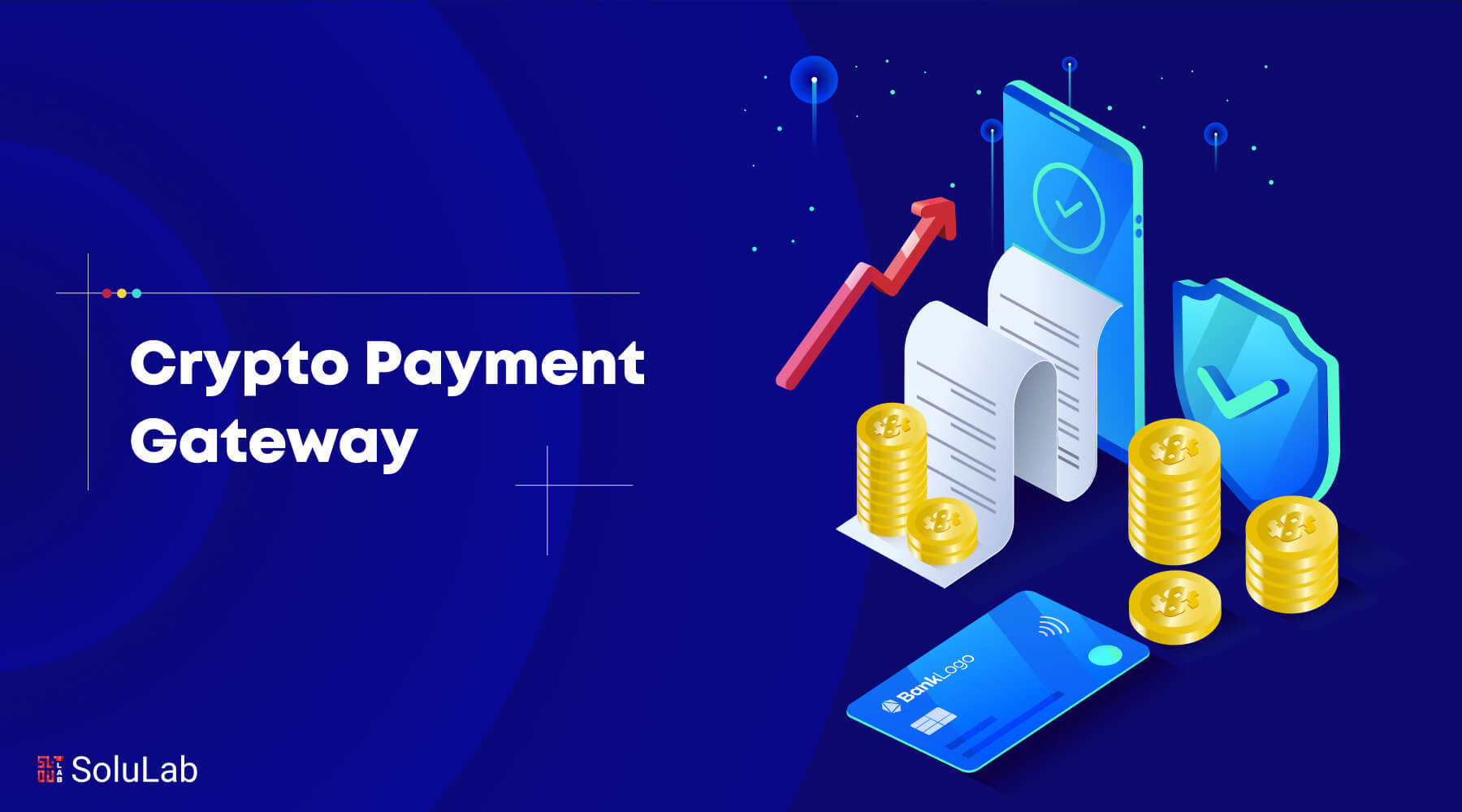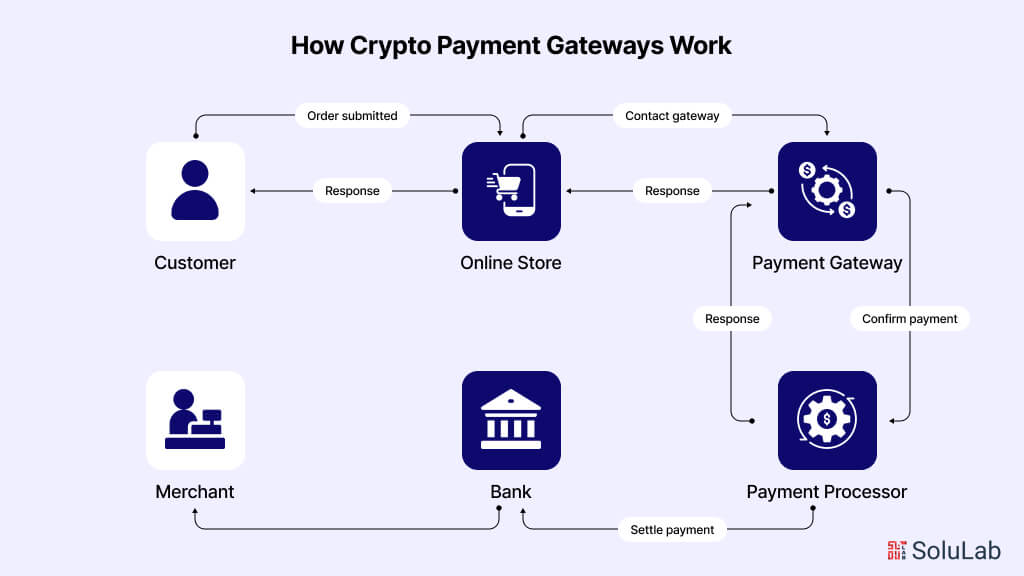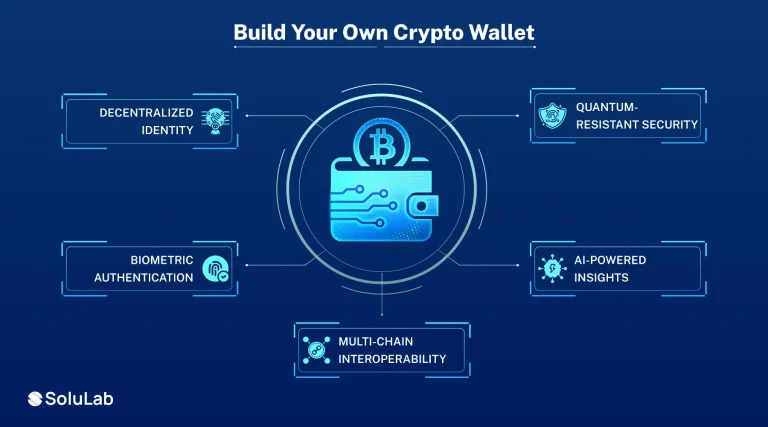
Have you ever used cryptocurrency to shop online or purchase coffee?
Yes… Today, many enterprises, ranging from modest coffee shops to extensive online retailers, are already accepting cryptocurrencies in the same way as cash or credit cards. Cryptocurrency payments are more prevalent, facilitating swifter and more accessible transactions globally.
| The crypto payment gateway market is projected to attain $5.37 billion by 2032, with a CAGR of around 17.8%. |
This explains why an increasing number of businesses and entrepreneurs are entering the crypto market. As this tendency escalates, payment gateways must expand to meet the rising demand.
In this blog, we will talk about what a crypto payment platform is and how it works for anyone who wants to offer cryptocurrency as a payment method. Let’s delve deeper into this!
What are Crypto Payment Gateways?
Crypto payment gateways are becoming an important part of how businesses accept money in the digital age. They allow companies to accept cryptocurrencies like Bitcoin, Ethereum, or stablecoins directly from customers, just like they would with traditional cards or wallets.
At a basic level, a crypto payment gateway helps process the transaction between the customer and the business. It verifies the payment, manages any necessary currency conversion, and ensures that funds are received safely and quickly. The process feels seamless for the user but gives the merchant a powerful way to expand payment options beyond traditional systems.
In short, crypto payment gateways make accepting digital currencies feel simple, secure, and accessible. They help businesses grow in a changing economy where flexibility and innovation are essential.
Core Features That Define a Crypto Payment Gateway
Crypto payment gateways operate on decentralized blockchain networks, allowing merchants to accept digital currency from customers around the world. What makes these gateways stand out are their built-in strengths, such as enhanced security, global accessibility, and the ability to settle transactions almost instantly.
-
Security
Since these gateways are powered by blockchain infrastructure, they come with high built-in protection. Every transaction is recorded on a tamper-proof ledger, significantly reducing the risk of data tampering or fraud. Many providers go a step further by using tools like multi-signature authentication and advanced encryption to safeguard sensitive data. This makes them a trustworthy option for businesses and consumers alike.
-
No Middlemen
One of the defining traits of blockchain technology is that it supports direct transfers between parties. Crypto payment gateways take full advantage of this, eliminating the need for banks or financial processors to handle the payment. As a result, funds move faster and users benefit from a more streamlined experience compared to traditional systems.
-
International Payments
Another major strength of crypto gateways is their ability to handle payments from customers regardless of location. Businesses can receive funds from clients in different countries without facing the usual delays or high fees often seen with banks or legacy payment networks. This feature is particularly valuable for global companies that need a flexible, borderless payment option.
-
Instant Processing
Because there are no third parties involved and transactions are validated on the blockchain, payments through crypto gateways are often completed in seconds. The speed is especially useful for time-sensitive transactions. Many platforms also offer automatic currency conversion so that businesses can receive payments in their preferred local currency quickly.
-
Reduced Fees
Compared to traditional processors that charge commissions or markups, crypto gateways typically involve much lower costs per transaction. This makes them attractive for both sides of the transaction. Customers pay less in service fees, and merchants retain a larger share of the payment value.
Advantages of Crypto Payment Gateway Development
The development of crypto payment gateways provides substantial benefits for various stakeholders. It represents a paradigm shift in the world of online transactions, offering numerous advantages for businesses, customers, and developers. Crypto payment gateways enhance security, enable global accessibility, and foster innovation, while also contributing to economic empowerment. Let’s delve into the specific ways in which crypto payment gateway development creates value for each of these stakeholders:
Benefits for Customers
1. Enhanced Security and Privacy: Crypto payment gateways offer customers strengthened security and privacy due to the decentralized and encrypted nature of blockchain technology. Transactions are highly secure, transparent, and immune to tampering, minimizing the risk of fraud and identity theft.
2. Unmatched Financial Sovereignty: Crypto payment gateway development empowers customers with unparalleled financial sovereignty, granting them full control over their funds. Unlike traditional banking systems where accounts can be frozen or transactions blocked, crypto transactions provide customers with ultimate ownership and autonomy over their assets.
3. Global Accessibility: With payment gateway cryptocurrency, customers can transcend geographical boundaries and engage in seamless borderless spending. They can purchase goods from international merchants or send remittances overseas without facing traditional banking restrictions or incurring exorbitant fees.
4. Rewarding Experiences: Through the integration of tokenization and decentralized finance (DeFi) protocols, crypto payment gateways offer customers unique rewards and incentives for their transactions. Loyalty tokens, yield farming opportunities, and diverse reward programs enhance the overall shopping experience and contribute to financial well-being.
Benefits for Merchants
- Enhanced Cost Savings: Merchants using crypto payments experience lower transaction fees compared to conventional payment methods. This allows them to retain a higher percentage of revenue per transaction.
- Minimized Chargebacks: Crypto transactions’ irreversible nature on the blockchain reduces the likelihood of chargebacks and payment disputes. This eliminates the time and resources spent on managing chargeback claims.
- Token-Based Loyalty Programs: Payment gateway cryptocurrency facilitate the creation of tokenized loyalty programs. Branded tokens redeemable for discounts, merchandise, or exclusive offers foster stronger customer engagement and loyalty.
- Micropayment Support: Crypto payment gateway development enables merchants to accept micropayments and microtransactions with low fees. This opens up new revenue streams, particularly in industries such as content creation, gaming, and digital media.
- Automated Business Operations: Integrating smart contracts into a payment gateway for cryptocurrency development automates various business aspects like contract execution, payment settlements, and supply chain management. This enhances efficiency, reduces administrative burden, and minimizes errors and disputes.
How Crypto Payment Gateways Work?

At the core of smooth and secure cryptocurrency payments lies the development of cryptocurrency payment solutions. Yet, how exactly do these gateways function? Delving deeper, we will explore the intricate details of the crypto payment gateway development process.
Step 1: Transaction Initiation
At the checkout page of an online store or service provider, a customer initiates a transaction by selecting cryptocurrency as their preferred payment method. The customer is then presented with a list of supported cryptocurrencies and prompted to choose the desired currency for the transaction.
Step 2: Fiat Currency Conversion
For merchants preferring traditional fiat currency payments, the chosen cryptocurrency can be automatically converted at the current exchange rate into fiat currency. This conversion can be executed by a third-party payment processor or an integrated cryptocurrency exchange gateway service within the payment gateway for cryptocurrency.
Step 3: Generating a Payment Address
Upon the customer’s confirmation of their chosen payment method, the crypto payment gateway automatically creates a specific payment address or QR code linked to the transaction. This address acts as the destination where the customer can send the specified amount of cryptocurrency from their crypto wallet.
Step 4: Verification and Confirmation Process
Once the customer receives the payment address, they initiate a transaction from their cryptocurrency wallet. This involves entering the recipient’s address and specifying the amount to be sent. The transaction is then broadcast to the relevant blockchain network for verification and confirmation by the network’s nodes.
Step 5: Verification on the Blockchain
The transaction is disseminated throughout the decentralized blockchain network, where nodes validate it via a process known as consensus. Several network participants must confirm the transaction before it is considered valid and irreversible. Depending on the cryptocurrency protocol, this process typically takes a few seconds to a few minutes. Once these confirmations are received, the transaction is deemed secure and cannot be altered.
Step 6: Merchant Notification
After the blockchain network confirms a transaction, the cryptocurrency payment gateway informs the merchant or service provider about the successful payment. This notification prompts the execution of the customer’s order or service request, ensuring a smooth completion of the transaction.
Step 7: Settlement and Payout
When a merchant chooses to accept payments in cryptocurrency, the funds are transferred to their designated cryptocurrency wallet.
Alternatively, if the merchant prefers to convert cryptocurrency payment solutions into fiat currency, the settled funds are exchanged at the current exchange rate and transferred to their bank account with crypto payment gateway.
Step 8: Customer Confirmation
As the final step, the customer receives confirmation of their successful transaction. This confirmation, often in the form of an email receipt or on-screen notification, provides assurance that their payment has been processed and their order or service request is being fulfilled.
In summary, crypto payment gateway development simplifies the process of exchanging cryptocurrencies for goods and services. These gateways follow a series of carefully planned steps to achieve this. By leveraging blockchain technology and cryptographic protocols, they ensure secure, transparent, and efficient transactions. This allows businesses and consumers to embrace the future of finance with confidence.
How to Build a Cryptocurrency Payment Gateway?
As more businesses turn to digital currencies, developing a reliable and secure crypto payment system is becoming increasingly important. Creating one involves a mix of technical expertise, strategic planning, and a clear understanding of both market trends and legal frameworks. The key steps involved in developing a cryptocurrency payment gateway:
1. Start with Market Research and Industry Evaluation
Every successful development project begins with research. Businesses need to assess current blockchain adoption trends, customer behavior, and global regulations. Studying how competitors structure their payment systems can also offer useful insights.
2. Select the Best-Fit Blockchain Network
Choosing the right blockchain platform—whether Ethereum for its smart contract capabilities, Binance Smart Chain for affordability, or Solana for speed—sets the foundation for performance and scalability.
3. Design and Build a Secure Transaction API
A strong application programming interface (API) is the core of any payment gateway. It acts as the bridge between the user, the business, and the blockchain. A well-structured API ensures real-time transaction processing, secure data handling, and compatibility with multiple cryptocurrencies.
4. Integrate Wallet Solutions
Wallet integration is essential for allowing users to manage their digital funds directly from the platform. Smart contracts help automate key parts of the transaction process, such as fund release and verification, without manual intervention.
5. Apply Strong Security Layers
Security and compliance should be at the core of any crypto payment gateway. Developers must incorporate features like encrypted communication, biometric or two-factor authentication, and real-time fraud monitoring. It is equally important to follow legal guidelines by implementing AML (Anti-Money Laundering) and KYC (Know Your Customer) protocols.
6. Rigorous Testing and Launch
Before going live, the entire system needs to be tested under multiple conditions. Functional testing, performance load checks, and detailed security audits are essential to uncover any weaknesses. After all major issues are resolved, the payment gateway can be officially rolled out to support real-world crypto transactions.
Cost of Developing a Cryptocurrency Payment Gateway
Building a cryptocurrency payment gateway is a complex project, and the total cost of development can vary significantly depending on a number of factors. For a basic version of a crypto payment gateway, the cost can start around $30,000 to $50,000. This would usually include essential modules like a user dashboard, transaction history, API development, and simple KYC verification.
Here are a few key components that influence development cost:
- Blockchain Selection: Developing on Ethereum may cost more due to gas fees and smart contract complexities, while newer networks like Solana or Polygon can be more economical but may require specific technical expertise.
- Security Infrastructure: High-level encryption, multi-signature wallets, and compliance checks increase both the safety and cost of your solution.
- Custom Features: Adding features like analytics dashboards, user roles, or multi-language support can push development timelines and budgets higher.
- Third-Party Integrations: Connecting with exchanges, liquidity providers, or identity verification tools (such as KYC/AML APIs) brings added licensing or usage fees.
- Testing and Compliance: Security audits, performance testing, and legal vetting for crypto compliance can require a dedicated budget of their own.
Ultimately, the price to develop a crypto payment gateway isn’t fixed; it’s shaped by your vision, the level of customization required, and the standards you aim to meet in a competitive digital finance space.
Top Crypto Payment Gateways
In digital transactions, we will delve into notable examples of cryptocurrency payment gateways that have significantly transformed the landscape.
1. Coinbase
Coinbase Commerce, a cryptocurrency payment gateway service offered by Coinbase, the prominent cryptocurrency exchange gateway, enables merchants to easily accept cryptocurrency payments on their online stores or platforms. Supporting a range of cryptocurrencies including Bitcoin, Ethereum, and Litecoin, it provides instant settlements, customizable checkout options, and detailed analytics. These features empower businesses of all sizes to embrace cryptocurrency payments confidently.
2. BitPay
BitPay, a prominent player in the domain of crypto payment gateway development, offers a comprehensive set of processing crypto payment solutions for both individuals and businesses. With BitPay, merchants gain the ability to accept Bitcoin and Bitcoin Cash payments through online and in-person channels like the Bitcoin payment gateway. They also benefit from features like support for multiple currencies, automatic conversion to fiat currency, and expedited settlements.
3. PayPal
PayPal, renowned for online payments, allows users to send and receive money effortlessly and securely. It bridges traditional financial systems with the agility of crypto transactions, enabling users to access both fiat and digital currencies conveniently within a single platform. Its integrated price alert system empowers users to stay informed about crypto market fluctuations, facilitating timely decision-making.
The aforementioned examples provide valuable insights into the best crypto payment gateways. These platforms play a crucial role in fostering the adoption of cryptocurrencies in the digital economy by offering innovative features and solutions.
Future Trends in Crypto Payment Gateway Solutions
As businesses and individuals increasingly adopt digital currencies, the demand for the best crypto payment gateway has soared. Cryptocurrency payment gateways offer seamless and secure transaction processes, making it easier than ever to integrate crypto payment solutions into your business operations. These gateways, such as bitcoin payment gateways, facilitate smooth transactions, enhancing user experience and trust.
As you explore the payment gateway for cryptocurrency, it’s essential to consider the unique needs of your business and select a gateway that offers the best features and security. Companies like SoluLab are at the forefront, providing comprehensive crypto payment gateway development solutions tailored to your business requirements. By partnering with experts in the field, you can ensure your crypto payment gateway is not only efficient but also future-proof, ready to adapt to the evolving landscape of cryptocurrency transactions and crypto wallets.
The Bottom Line
Crypto payment gateways are quickly becoming essential in today’s digital economy. As more users embrace digital currencies for everyday spending, businesses that adopt these solutions early can offer better experiences and stay ahead of the curve. From faster transactions to lower processing fees and access to a global customer base, the advantages are hard to ignore.
SoluLab has been working closely with forward-thinking companies to bring crypto development solutions to life. One of our recent projects, Token World, is a next-gen crypto launchpad built to connect blockchain startups with active investors. The platform helps creators showcase their projects and allows investors to discover genuine opportunities through a simple and engaging experience.
If you are planning to build a crypto payment gateway or need support in navigating the digital currency space, SoluLab is ready to assist you. Schedule a free consultation and get started!
FAQs
1. What is a crypto payment gateway?
A crypto payment gateway is a digital payment processor that allows businesses to accept cryptocurrency transactions securely and efficiently.
2. What are the benefits of using a cryptocurrency payment gateway?
Cryptocurrency payment gateways offer benefits such as lower transaction fees, faster processing times, and enhanced security for cryptocurrency transactions.
3. How do I choose the best crypto payment gateway for my business?
To choose the best crypto payment gateway, consider factors such as transaction fees, supported crypto wallets, integration ease, and security features.
4. What are some popular cryptocurrency payment processors?
Popular cryptocurrency payment processors include CoinGate, BitPay, and CoinPayments, each offering various crypto payment solutions and services.
5. How does a cryptocurrency exchange gateway differ from a regular payment gateway?
A cryptocurrency exchange gateway facilitates the conversion between different digital currencies, while a regular payment gateway for cryptocurrency primarily processes payments.
6. What are the steps involved in crypto payment gateway development?
Crypto payment gateway development involves steps like market research, choosing the right technology stack, ensuring compliance with regulations, and implementing robust security measures.
7. Can I use a Bitcoin payment gateway for other cryptocurrencies?
Yes, many Bitcoin payment gateways support multiple cryptocurrencies, allowing businesses to accept a variety of digital currencies through a single platform.






